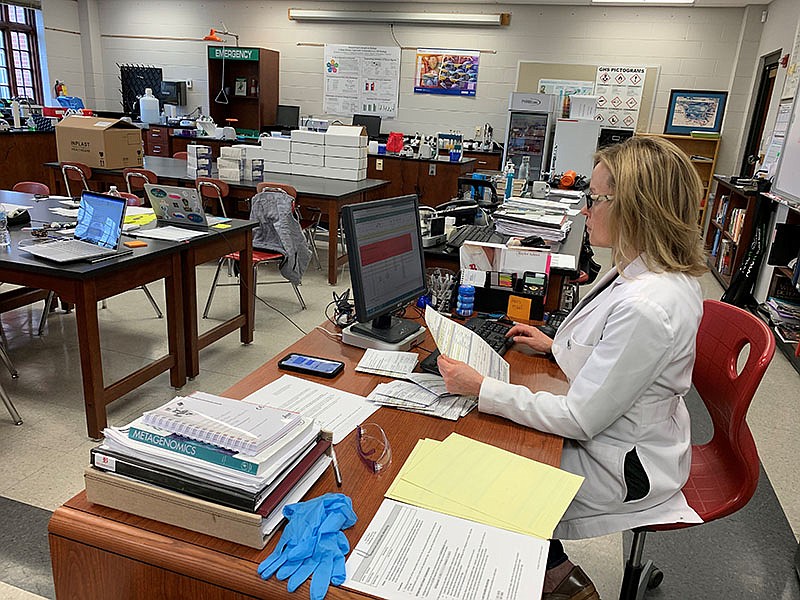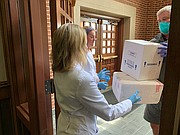When students all across the world began to return to instruction this fall, learning likely didn't look the same, something that is especially true at Chattanooga-area private schools. Just as there is no one-size-fits-all education model, each school has crafted its own unique plan that takes into account the size and age of its student body, facilities and resources.
And if McCallie and Baylor - two of the area's largest private schools - are any indication, parents are responding well to the often stringent safety protocols.
While Baylor's overall enrollment numbers are slightly lower than last year, the school saw an uptick in applicants in July.
"My guess is that has a lot to do with our COVID-19 response plan for the upcoming school year," says Ryan Armstrong, interim admissions director at Baylor. "We're very fortunate to have some of the resources that we have on campus. Baylor is likely the only school in the country with the ability to do COVID-19 tests and antibody tests on location, making us extremely well-prepared to test students and employees regularly and adapt as needed."
When the pandemic first hit, Baylor outfitted its multimillion dollar science lab to perform the tests, and later partnered with Hamilton County to test local hospital staff and patients. The school's technology and dedication of two staff teachers, Dawn Richards and Elizabeth Forrester, both degreed research scientists, cut the local test result time from around a week to a matter of hours.
McCallie also received an influx of applications in July, and the school expects more boarding students to its campus this fall than ever before, according to Jim Daughdrill, McCallie's dean of admission.
Last school year, McCallie opened with 256 boarding students, the greatest number in school history. McCallie had one of its strongest retention rates ever this year, topping last year's number with 266 boarders enrolled, he says.
McCallie saw an increase in day student enrollment as well, surpassing initial projections with 669 students enrolled as of July.
"Our admission team continues to work closely with the academic deans to maintain an enrollment level that allows for the safe operation of school with the required social distancing measures," Daughdrill says.
As private institutions across the region work to find safe solutions for paying families, many distinctive new practices and protocols have arisen.
Safe space
A major factor for reopening school in any capacity is supporting the socialization needs of kids, as many have been isolated away from friends and teachers for months after the premature closures of schools in March. But in a socially distanced world, that can be tricky when you add classroom walls into the mix.
One school is being quite literal in its commitment to breaking down barriers and divisions in its school.
Administrators at Girls Preparatory School decided to remove more than a dozen walls inside buildings across campus to expand the physical size of classrooms to allow for more space to social distance.
"We have been planning for our first day of school since March, with the goal to make our campus as safe as possible through physical distancing and safety protocols while still protecting the benefits of our all-girls learning environment," says Pamela Hammonds, marketing communications manager for GPS.
And with relatively small class sizes a signature of private education, social distancing is already an easier task than for public school counterparts. For example, GPS' typical class size is 14.
At Signal Mountain Christian School, which has a total enrollment of around 100, students attending in person will be split into grade-dependent cohorts.
"They will only mingle and hang out with their own cohort," says principal Danette Kelley. "Each grade will have their own bathroom and their own entrance and exit doors into the building. I think we're going to mitigate the spread of anything that way."
In the case of exposure to the coronavirus, this will also allow a smaller number of students to quarantine. "If one kid in a cohort gets a positive COVID test, just that grade will go home for 14 days; then that grade will come back," Kelley says.
Testing protocol
In addition to social distancing, for some area schools, testing is at the forefront of preventive measures.
While most schools are asking that students with symptoms or possible exposure to COVID-19 be tested for the virus, McCallie School and Baylor School - which both offer student boarding - required all students to present a negative test before returning to campus.
"All the data indicates that if you can get the students on campus the first week, making sure that there is nobody coming on campus that has a virus, that you've got a much better chance of having classes to continue for a long time," Bill Steverson, McCallie's public relations manager, explains of the decision.
At Baylor, administrators are taking testing protocols a step further. The school has equipped its testing lab to process samples right on campus and is planning to systematically test 20% of its staff and student population each week, a measure administrators hope will keep them ahead of any possible infections.
"I think that does give us some extraordinary capacity to monitor closely the health of our school family," says headmaster Scott Wilson. "And if anybody were to become symptomatic ... say it's the sniffles and a sore throat, we can immediately test and make sure that it's nothing more than that."
The school's on-site Health Center, recently updated to be a central point of care for symptomatic students, will offer a rapid test to rule out flu, strep or other illnesses, according to the school's "Reopening Campus" plan.
"Baylor is fortunate to remain in a good place, financially," says Armstrong. "While the past few months have been challenging for many schools and nonprofits, our donors were steadfast in support of our annual fund, helping us reach another historic milestone with more than $2.375 million raised during the 2019-20 school year."
That amount exceeded the school's fundraising goal for last year by almost $130,000, bumping Baylor's endowment to $135 million.
An app for that
Many of the area's private schools are also utilizing self-reporting apps that allow students and families to report any coronavirus-related symptoms or possible exposures before coming to class each day. Bright School and Chattanooga Christian School are two that have partnered with local health care analytics company Base Camp Health for use of its new app, Ascend.
"You can access it via computer, via smartphone, it takes less than a minute and assesses if you're sick, if you're a carrier, if you've been exposed to the coronavirus, and then it provides you with the communication on what to do that day - do you have enough risks that you shouldn't be on-site [at school or work]," explains Base Camp CEO Leigh McCormack, a veteran data scientist. "It's just a tool that guides them and communicates what your employer wants communicated as the next step."
Following a 15-second series of questions concerning symptoms and exposures, the app calculates over 100 risk factors combined with the latest information from the Centers for Disease Control, the county health department, school district and other authorities to present its ruling. Its tagline is, "Don't just track Covid - predict and defeat it."
Tech talks
While a majority of schools are requiring face coverings during class, some have additional monitoring protocols and innovations in place. GPS, for example, has installed no-touch scanning kiosks that confirm those who pass by are wearing a face covering and performs temperature checks.
In the instance of school being forced online, and for those opting for virtual learning from the get-go, schools are investing in other technology for both classrooms and kids.
At GPS, classrooms are equipped with iPads and cameras to track and follow teachers as they talk and instruct. Signal Mountain Christian School has also invested in recording technology "so all the kids don't have to be on at the same time in a family," says Kelley. The Bright School, meanwhile, is providing its students with Chromebooks and iPads in the hopes of having an easier transition in case school has to go virtual.
"Bright School is committed to welcoming our students on campus," stresses Director of Marketing and Communications Elizabeth Davis, adding that, "Through additional technologies and advanced preparation, we will be able to provide, as well, a seamless integration between classroom and home should the situation change dramatically."
Notre Dame High School's director of admissions, Laura Goodhard, says students are adjusting well to the new reality of learning amid a pandemic.
"Our students have complied beautifully with the new protocols," she says in reference to the daily health and temperature checks, one-way hall traffic, mandatory face masks and limited locker use. "They want school to remain open and are willing to do what it takes to keep everyone healthy and safe."
The way forward
Across all campuses, there appears to be a strong commitment to prioritizing the needs of students, which go beyond the classroom in many ways.
With some families at McCallie and Baylor struggling financially due to the pandemic, Baylor created a COVID-19 relief fund that allows donors to support those families and continue to make the school an affordable option for them, says Armstrong.
When McCallie moved to distance learning in March, the school's board of trustees established an initiative within McCallie's annual fund to provide additional tuition assistance. "Thanks to their foresight and the generosity of hundreds of alumni and friends of the school, we were able to make dozens of one-time hardship grants to families experiencing the economic effects of COVID-19," says Daughdrill.
Wilson hopes families, staff members and the local community take personal responsibility to aid schools' efforts to promote wellness and learning.
"During the course of the year, we just want to make sure that people are responsible. And that's not just Baylor, it's everywhere. ... Even though we've got all this bandwidth - we've got the testing, we keep this place clean, we've got enough room to social distance, we've got all of that - really, at the end of the day [to maintain] our ability to be truly protective of everyone's health, we're going to have to be responsible away from school too."

